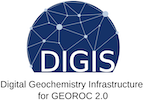

If your data are not yet included in GEOROC, we invite you to submit data files that accompany one of your past publications or a new manuscript to the DIGIS Data Repository.
The DIGIS Data Repository is a research data repository in the Earth Sciences domain with a specific focus on geochemical data. It is jointly curated by DIGIS and GFZ Data Services and hosted as a GFZ Data Services repository. The DIGIS Data Repository archives, publishes and makes accessible user-contributed, peer-reviewed research data that fall within the scope of the GEOROC and similar databases.
Please note that it is DIGIS policy to publish datasets only if they are associated with a research publication. Any exceptions from this rule requires exceptional justification and a case-specific decision by DIGIS data curators.
Further details and data submission templates are available in the repository guidelines and policies. For any inquiries or issues, please contact the DIGIS curatorial staff at digis-info@uni-goettingen.de.
There are different types of datasets you can publish with the DIGIS Data Repository:
1. New Datasets: